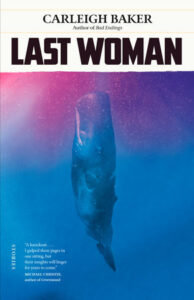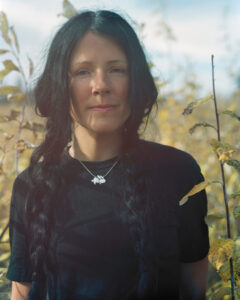Rot beneath the gloss
Last Woman
by Carleigh Baker
Toronto: McClelland & Stewart, 2024
$24.95 / 9780771004148
Reviewed by Candace Fertile
*

Carleigh Baker’s second collection of short stories, Last Woman, demonstrates a lively imagination combined with a gently sardonic wit, making for an enjoyable afternoon reading on the couch.
The fifteen stories range from the realism of a tough canoe portage in “Midwives” to a three-part story about billionaires in space from the perspective of another species. Vancouver-based Baker (Bad Endings) appears to have her finger firmly on the pulse of contemporary life and delivers trenchant criticisms of human foibles while managing to create convincing characters, even when they are aliens.
Sensitivity to First Nations cultures and issues is another welcome hallmark of Baker’s work. She is of nêhiyaw âpihtawikosisân and European ancestry, and the friction between the two provides rich material. In “Midwives,” the first story, the narrator goes on a canoe trip that seems to involve more pushing than paddling. And it’s an example of autofiction as it captures some of Baker’s life. The narrator comments on the impossibility of carrying the canoe as it’s too heavy. And her knowledge of canoeing appears to come from Google rather than experience.
As she exclaims about the struggle:
Convincing myself that I have some kind of blood connection to the land, even though I come from the city. Dumbass. I think the only thing I hate more than the land right now is this goddamn canoe.
Self-deprecation is a familiar theme in Baker’s work, and it’s done with satisfying humour.
On occasion, the humour is laugh-out-loud. In “Billionaires: Part 1 Jo Sparks,” Jo is observed by the Utopsians who are keeping tabs on Earthling billionaires attempting to find planets to inhabit. Jo is described as being not “too jazzed with the usual career choices for a young heiress: music DJ, festival organizer, senior advisor to the president, etcetera.” After some failed real estate ventures, Jo decides to become an “influencer.” Baker nails the ending as the Utopsians report that “Based on Utopsian research there are no popular narratives of Earth billionaires that include any sort of legitimate redemption, and as of today, there still aren’t.” The science fiction part of the story just seems realistic.

The housing crisis in Vancouver is the context for “Co-op.” In the story, a couple get into a co-op because some strings were pulled, but a requirement of residency is being a family, so Operation Make A Baby is on. Neither the narrator Maria nor her feckless partner Colin actually wants a baby. But they do need a place to live. At the beginning Maria is avoiding the mothers in the co-op and making fun of children’s names: “Timmy shakes his head and points at Zephyr, who is still mewling into his other’s chest. Yep, Zephyr. Honestly, these stunt names are going to turn the next generation into an army of darkness.” On the final pages, Maria has changed; how that transformation is effected is both bizarre and believable. It certainly has something to do with the power of community and behavioural norms.
Baker can also do devastating destruction and despair as in “The Miden,” a heart-breaking story about urban decline due to development. Companies buy houses and leave them empty to hollow out a neighbourhood while they wait to buy more property to develop. Families break down. Abused by her partner, Taryn meets a young man as she explores abandoned homes. He’s tagging them with spray paint and gradually reveals he’s abused by his father. And then Taryn finds his body.
Overall, humour prevails even while it’s directed at the ruination of individuals and the world. But Barker is sharp—and her friendly and chatty voice has the ability to peel back the layers of artifice in the current situation to the disintegration of lives under the gloss.
*

Candace Fertile has a PhD in English literature from the University of Alberta. She teaches English at Camosun College in Victoria, writes book reviews for several Canadian publications, and is on the editorial board of Room Magazine. [Editor’s note: Candace Fertile has reviewed books by Kathryn Mockler, Lucia Frangione, Darcy Friesen Hossack, Robin Yeatman, Emi Sasagawa, Patti Flather, Peter Chapman, Janie Chang, Pauline Holdstock, Ava Bellows, Beth Kope, Geoff Inverarity, and Angélique Lalonde for BCR.]
*
The British Columbia Review
Interim Editors, 2023-25: Trevor Marc Hughes (nonfiction), Brett Josef Grubisic (fiction)
Publisher: Richard Mackie
Formerly The Ormsby Review, The British Columbia Review is an on-line book review and journal service for BC writers and readers. The Advisory Board now consists of Jean Barman, Wade Davis, Robin Fisher, Barry Gough, Hugh Johnston, Kathy Mezei, Patricia Roy, Maria Tippett, and Graeme Wynn. Provincial Government Patron (since September 2018): Creative BC. Honorary Patron: Yosef Wosk. Scholarly Patron: SFU Graduate Liberal Studies. The British Columbia Review was founded in 2016 by Richard Mackie and Alan Twigg.
“Only connect.” – E.M. Forster
3 comments on “Rot beneath the gloss”